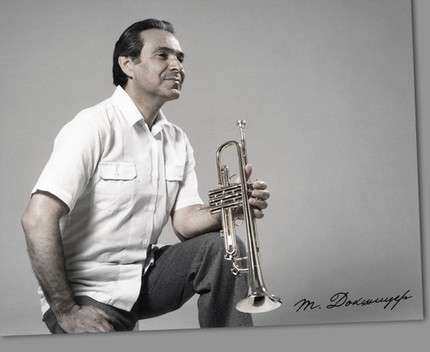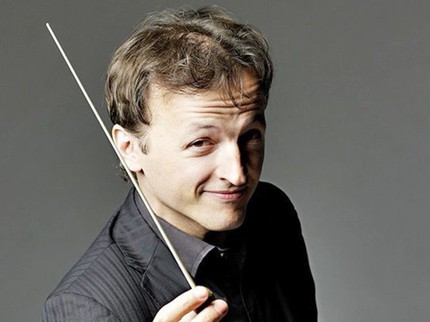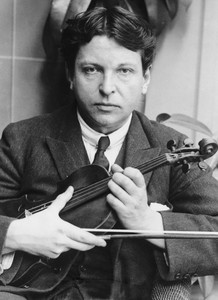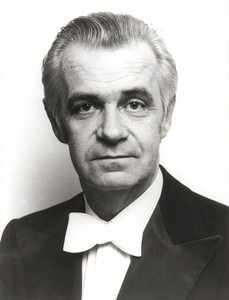
Timofei Alexandrovich Dokschitzer |
Timofei Dokschitzer

Among the legendary musicians of Russian culture, the name of the phenomenal musician, trumpeter Timofey Dokshitser takes pride of place. In December last year, he would have turned 85 years old, and several concerts were dedicated to this date, as well as a performance (the ballet The Nutcracker) at the Bolshoi Theater, where Dokshitser worked from 1945 to 1983. His colleagues, leading Russian musicians who once played with Dokshitzer in the Bolshoi orchestra – cellist Yuri Loevsky, violist Igor Boguslavsky, trombonist Anatoly Skobelev, his constant partner, pianist Sergei Solodovnik – performed on the stage of the Moscow Gnessin College in honor of the great musician.
This evening was generally remembered for its upbeat atmosphere of the holiday – after all, they remembered the artist, whose name to a certain extent became the musical symbol of Russia along with D. Oistrakh, S. Richter. After all, it was not for nothing that the famous German conductor Kurt Masur, who repeatedly performed with Dokshitzer, said that “as a musician, I put Dokshitzer on a par with the world’s greatest violinists.” And Aram Khachaturian called Dokshitser “the poet of the pipe.” The sound of his instrument was enchanting, he was subject to the most subtle nuances, cantilena, comparable to human singing. Anyone who once heard the game of Timofey Aleksandrovich became an unconditional fan of the trumpet. This, in particular, was discussed by the Deputy Director of the Gnessin College I. Pisarevskaya, sharing her personal impressions of the meeting with the art of T. Dokshitser.
It seems that such high ratings of the artist’s work reflect the incredible depth and versatile facets of his talent. For example, T. Dokshitser successfully graduated from the conducting department under L. Ginzburg and at one time led performances at the Branch of the Bolshoi Theater.
It is also important to note the fact that with his concert activity Timofey Alexandrovich contributed to a new look at the performance on wind instruments, which, thanks to him, began to be considered full-fledged soloists. Dokshitser was the initiator of the creation of the Russian Guild of Trumpeters, which consolidated musicians and contributed to the exchange of artistic experience. He also paid much attention to expanding and improving the quality of the trumpet repertoire: he composed himself, commissioned works by contemporary composers, and in recent years compiled a unique musical anthology, where many of these opuses were published (by the way, not only for the trumpet).
T.Dokshitser, who studied polyphony at the conservatory with Professor S.Evseev, a student of S.Taneyev, was engaged in instrumentation with the composer N.Rakov, and he himself made brilliant arrangements of the best samples of the classics. The memorial concert featured his transcription of Gershwin’s Rhapsody in the Blues, performed by soloist of the Bolshoi Theater of Russia, trumpeter Yevgeny Guryev and the college symphony orchestra conducted by Viktor Lutsenko. And in the “crown” plays – in the “Spanish” and “Neapolitan” dances from “Swan Lake”, which Timofey Alexandrovich played inimitably, – this evening A. Shirokov, a student of Vladimir Dokshitser, his own brother, was the soloist.
Pedagogy occupied an equally important place in the life of Timofey Dokshitser: he taught at the Gnessin Institute for more than 30 years and raised a galaxy of excellent trumpeters. Having moved to live in Lithuania in the early 1990s, T. Dokshitser consulted at the Vilnius Conservatory. As noted by musicians who knew him, Dokshitser’s pedagogical method largely generalized the principles of his teachers, I. Vasilevsky and M. Tabakov, focusing primarily on nurturing the student’s musical qualities, on working on a culture of sound. In the 1990s, T. Dokshitser, maintaining the artistic level, organized competitions for trumpeters. And one of its laureates, Vladislav Lavrik (first trumpet of the Russian National Orchestra), performed in this memorable concert.
Almost two years have passed since the great musician passed away, but his discs (the golden fund of our classics!), remained his articles and books, which depict the image of an artist of genius talent and the highest culture.
Evgenia Mishina, 2007





